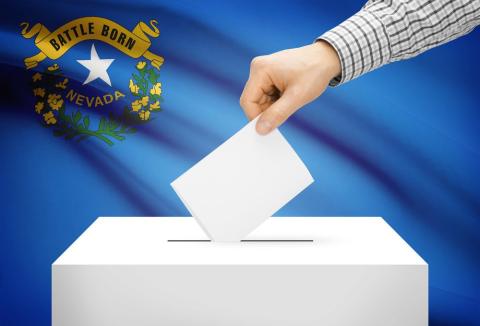CARSON CITY, Nev.-- In an effort to strengthen the voice of Nevada voters, Nevadans for Election Reform filed the “Greater Choice – Greater Voice” initiative with the secretary of state. The initiative seeks to replace the state’s current partisan closed primary system with a single election in November using ranked choice voting (RCV). The plan would combine the state’s primary and general election, which would save taxpayers money.
"It doesn't matter what the issue or how critical finding a solution is, unless those responsible for solving the problem are willing to talk to each other, nothing will happen,” said Doug Goodman, founder and executive director of Nevadans for Election Reform. “Ranked choice voting will help us elect leaders who will work together for the common good.”
Ranked choice voting is an easy, yet effective way to elect candidates more reflective of a majority of voters in a single election, even when several viable candidates are in the race. It does this by having voters mark their ballot for their first, second, and third choice then counting the votes in rounds:
First, every vote counts for its first choice. If a candidate has more than half of the vote based on first-choices, that candidate wins. If no candidate has more than half of those votes, then the candidate with the fewest first choices is eliminated.
The voters who selected the defeated candidate as a first choice will then have their votes added to the totals of their next choice. This process continues until a candidate has more than half of the active votes or only two candidates remain. The candidate with a majority among the active candidates is declared the winner.
The use of RCV dates back to the 1890’s and is currently used in some form in six states, over a dozen cities, by political parties, business, and academia. Even the Motion Picture Academy of Arts and Sciences uses RCV to determine all the Oscar nominees, as well as the winner of Best Picture.
By ranking candidates voters will be able to vote their conscience without fear of being a spoiler. Implementation of the “Greater Choice – Greater Voice” initiative could provide taxpayers a $3 - $4 million savings every election cycle without infringing on political parties’ First Amendment right of association.
By implementing a single election using RCV, voters will also experience:
- Less negative campaigning as candidates must reach out to all voters not just a narrow partisan base;
- A greater choice as all candidates of all parties and independents are vying for votes;
- Having more information as all candidates become viable; and
- Elected officials who collaborate on solutions without the fear of upsetting their party's narrow base and being “primaried.”
Nevadans for Election Reform is a registered Political Action Committee. It has been working election reform issues at the legislative level since 2013.
Efforts have resulted in two bills being introduced; one in 2015 for a top-three primary with an RCV general and a top-two primary bill in 2017. Organizers contend that the lack of broad legislative support for these bills is the driving force to encourage the voters themselves to act.
Shrinking party affiliation is another rationale for reforming the electoral process. Nearly 28 percent of active voters in Nevada are not registered to vote with either the Democratic or Republican Party. More than 21 percent are registered as nonpartisan. These figures are ten percent higher among those 18 to 34 years of age, and these numbers are growing.
“The Greater Choice, Greater Voice Initiative could be a game changer in Nevada politics,” Goodman said. “By instituting ranked choice voting for our elected offices, this initiative will allow all of us in Nevada to be represented - not just the political party bases and special interests.”
For more information, visit the Nevadans for Election Reform website at www.nevadansforelectionreform.org.
Photo Credit: Niyazz / shutterstock.com
